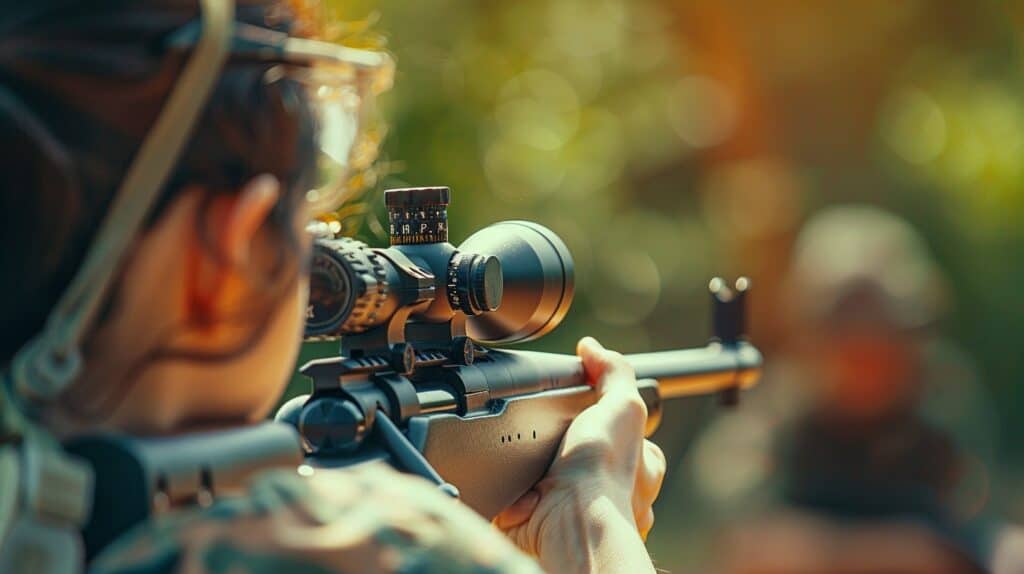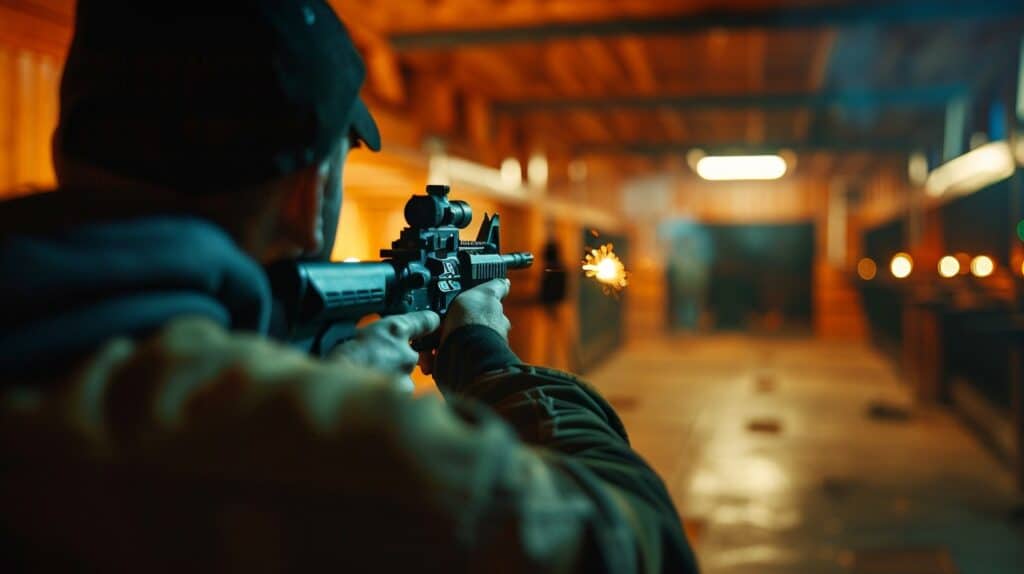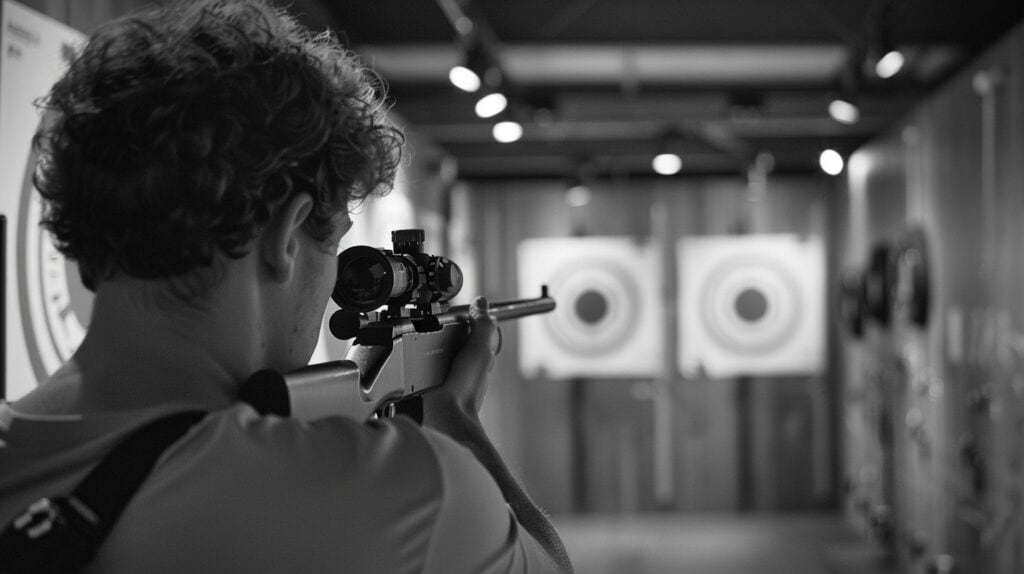Feeling stuck in a rut? Shooting is a sport that packs both fun and excitement. This article will guide you through the basics, from picking up your first firearm to hitting that exhilarating bull’s eye.
Ready for an adventure?
Key Takeaways
Starting a shooting hobby brings excitement. Learn from a mentor, take beginner courses, and pick the right gun for you.
Practicing at the range or in nature can lead to hitting your first bull’s eye or bagging your first game animal. It’s thrilling!
Different guns offer different experiences – handguns for precision, rifles for distance, and shotguns for spread shots.
Safety is key in shooting sports. Always follow firearm safety rules and respect every gun’s power.
Shooting sports mix fun with skills like patience and precision. They offer something for everyone, from casual target practice to competitive shooting events.
Table of Contents
Exploring the World of Shooting

Jumping into shooting sports means tapping into a mix of tradition and thrill. You’ve got handguns, rifles, and shotguns to choose from, each bringing its own flavor to the table. Handguns are all about precision – like trying to thread a needle from yards away.
With rifles, it feels like reaching out and touching the horizon, thanks especially if you’re using something with a thermal riflescope. Then there’s shotgun shooting; imagine the spread of shots as painting targets across the sky.
Stepping onto a shooting range brings that moment of truth. There’s more than just pulling triggers. It’s about lining up your sights, feeling your heartbeat in your fingertips, then… bang! The joy of seeing your aim true on target is unmatched. And hey, variety spices things up even more – plinking cans for fun or competing in bullseye competitions adds different layers of excitement.
Each round fired is another step towards mastering this craft; every clang on metal or puff on clay pigeon tells you got it right…
Steps to Starting a Shooting Hobby

Starting your shooting hobby can feel like stepping onto a movie set. You’re the star, and every shot is your moment in the spotlight. First up, grab someone who knows their way around a rifle or pistol like you know your Netflix password—they’re going to show you the ropes without letting you stumble.
Then, sign yourself up for a beginner’s class where bulls-eye dreams begin, and safety isn’t just preached but practiced with each squeeze of the trigger.
Picking out your first gun is like choosing a dance partner—you need one that fits right in your hands and moves with you seamlessly. Whether it’s a smaller caliber handgun for precision or a larger gauge shotgun that speaks to the cowboy within, that choice marks the beginning of countless adventures at ranges and open fields alike.
Finding a mentor
To dive into shooting, getting a mentor is like finding a gold mine. They’ve been where you are, missed shots, and hit bull’s eyes. A good mentor can show you the ropes, from holding your piece correctly to understanding the importance of ear protection at the range.
They’ll introduce you to different types of firearms – perhaps their trusty rifles or those sleek handguns they favor for quick draw challenges.
Having someone in your corner means less guesswork at the gun shop. Instead of buying whatever looks cool, they help pick out what works best for your grip and style—maybe a lightweight pistol instead of a bulky rifle, for starters.
Plus, practicing with them at the local range gets safer and more fun. You learn not just how to shoot, but also about respecting every firearm’s power—a lesson no handbook teaches better than an experienced shooter by your side.
Enrolling in a beginner’s shooting course
Jumping into a beginner’s shooting course opens doors to the exciting world of shooting sports. You get to learn the four rules of firearm safety, crucial for anyone handling guns.
These courses don’t just show you how to aim and shoot; they introduce you to various firearms, from handguns to rifles. Imagine knowing your way around pistols and shotguns, feeling confident at any range.
Courses also shine a light on different ways to enjoy shooting—be it hitting clay pigeons or aiming for bullseyes in competitive arenas. They stress that while skills are important, so is having fun responsibly.
So, whether it’s pulling triggers at stationary targets or engaging in cowboy action shoots, there’s something for everyone. Plus, you meet folks who share your enthusiasm for recreational firing or even those seasoned in practical shooting disciplines.
Selecting your first firearm
Picking out your first gun is like choosing your first car—it’s got to fit right and feel good. Before you buy, hit the range. Try different shooters: revolvers, rifles, maybe even a pellet rifle or two.
Think about how each one feels in your hand, how it balances when you aim. Getting this hands-on experience is key because what works for Jason Bourne might not work for you.
Next up, think about what you want to do with it. Are clay pigeons your thing? Or are you looking at bullseye competitions where precision matters most? Different activities call for different types of firearms—shotguns for skeet shooting, precise handguns for target practice.
And remember, safety first! Get familiar with gun safety rules and always respect them while handling any firearm. Your choice should not only be fun, but also safe to use within your intended hobby area.
The Joy and Thrill of Target Practice

Hitting your first bull’s eye feels like winning a gold medal in the Olympics of fun. It’s that rush of excitement when the bullet meets its mark, and you know… this is what joy tastes like.
Every time you load up, aim, and fire at those clay pigeons or steel shapes, it’s like telling the world you’re here to make a splash. And let’s not forget about bagging your first game animal—it’s an adventure that turns stories into legends among friends.
Grab your gear, head out to the range or woods, and let every shot tell its own thrilling tale. Ready to dive in?
Hitting your first bull’s eye
Nailing that first bull’s eye is a moment you’ll never forget. Your heart races, palms sweat, and then—bam—a direct hit. It’s like the universe high-fiving you. This isn’t just about pulling the trigger on your gun; it’s about patience, precision, and practice all coming together in one perfect shot.
Whether it’s during target shooting or competitive events, landing that bull’s eye tells you, “Yep, I’ve got this.”.
Imagine stepping up to the line with your firearm ready. You take a deep breath, aim carefully at the shooting target down range, and steady your hand. The world seems to hold its breath for a second as you squeeze the trigger… and there it is—the unmatched joy of hitting dead center. It’s more than skill; it’s a thrilling mix of control and excitement packed into one moment. At this point, words like metallic silhouette or clay targets aren’t just terms—they’re part of your victory dance.
Bagging your first game animal
Bagging your first game animal is a thrill like no other. You’ve been to the shooting range, practiced your aim, and learned all about firearm safety. Now, it’s time for the real deal.
Picture yourself out in the wild, rifle in hand, eyes scanning for the perfect target. It’s not just about pulling the trigger; it’s about patience, precision, and respecting nature.
The moment arrives—your target steps into view. Heart racing, you recall every tip from your mentor and shooting courses. Slowly breathe out… aim… fire! The sound echoes through the trees as you realize: you’ve done it.
That mix of excitement and pride? That’s what hunters live for—bringing home their first catch, with respect to both skill and sportsmanship.
FAQs About Shooting Hobby Basics
What’s the buzz about recreational shooting?
Recreational shooting is all about fun and thrill! It’s like hitting a home run or scoring a touchdown but with targets. Whether you’re into clay pigeon shooting or aiming for bullseyes, it’s one hobby that keeps your adrenaline pumping.
Do I need my own gear to start?
Not right off the bat! Many shooting ranges offer rentals, so you can try different small arms, from rifles to air rifles like the Red Ryder. It’s like test-driving cars before picking your favorite.
Is this hobby just for lone wolves?
Not at all! Shooting can be as social as a barbecue party. There are competitive shootings and Olympic events where camaraderie runs deep. You might start solo but end up part of a squad, cheering each other on.
Can kids join in the fun too?
Absolutely! With proper guidance and safety measures, kids can learn discipline and focus through activities like BB gun competitions or benchrest shooting. It’s better than video games – they get real-life skills!
How do I hit that first bullseye?
Patience is key – Rome wasn’t built in a day! Start with basics: stance, grip, aim. Practice makes perfect; soon enough, hitting that bullseye will feel as sweet as pie.
Are there hobbies within this hobby?
You bet! From cowboy action shooting to fast draw contests, there’s always something new to try out once you get comfortable pulling triggers safely—think of it as different flavors of ice cream at your favorite parlor.




